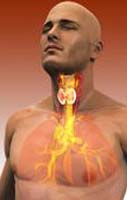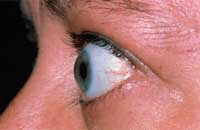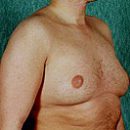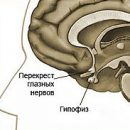In the development of diffuse toxic goiter, permanent nerve stress and neuropsychiatric disorders plays a decisive role. In some cases, the provoking factor serve encephalitis, meningitis and even flu.
Content
Basedova disease is one of the most common endocrine diseases. Women meets 4-5 times more often than men. Thyareotoxicosis may occur at any age, but most often amazes people aged 20-40 years.
The disease is due to the increase in the function of the thyroid gland and entering the blood of excessive hormone into the blood - thyroxine.
Risk factors for the development of the disease
One of the most important factors determining the occurrence and development of the disease is the factor of nervous stress, neuropsychic. According to some researchers, acute mental trauma is marked in 80% of all patients with thyrotoxicosis. Separate cases of the epidemic of the disease are described (the outbreak of thyrotoxicosis was observed in Denmark during World War II).
Sometimes a disease occurs against the background of transferred encephalitis, meningitis, any infectious disease (even influenza!) or after the brain injury.
Mechanisms for the development of the disease
 With a baseline disease, the thyroid gland highlights the elevated amount of thyroxine into the blood. In excess in various organs and tissues, thyroxine penetrates into the cells, changes the permeability of their membrane, violates the normal course of oxidative processes. As a result, the energy released during oxidation is not accumulated, but it goes to the formation of heat. This leads to an increase in body temperature, an increase in the main exchange and expansion of peripheral vessels. On the other hand, the energy reserves are significantly reduced in the body, which in a healthy person is spent on the needs of the body and the normal functioning of cells of various organs.
With a baseline disease, the thyroid gland highlights the elevated amount of thyroxine into the blood. In excess in various organs and tissues, thyroxine penetrates into the cells, changes the permeability of their membrane, violates the normal course of oxidative processes. As a result, the energy released during oxidation is not accumulated, but it goes to the formation of heat. This leads to an increase in body temperature, an increase in the main exchange and expansion of peripheral vessels. On the other hand, the energy reserves are significantly reduced in the body, which in a healthy person is spent on the needs of the body and the normal functioning of cells of various organs.
Due to the abnormal energy consumption, one of the hormonal regulation links is disturbed in the body, which leads to a deep disorder of all organs and systems.
The work of the thyroid gland and the level of thyroxine in the blood is regulated by the pituitary gland (hypothalamic centers of the front share). With functional or organic disorders of central devices of the nervous system, hypotalamic centers may come to the excitation state, and control over the work of the thyroid gland will be broken. The centers of the hypothalamus cease to respond to the content of thyroxine and, despite its excess in the body, the thyroid gland will continue its development.
Symptoms of the Basned Disease
Since the hormones of the thyroid gland affect the work of all organism systems, the complaints of patients with thyrotoxicosis are very diverse. Patients complain of sharp general weakness, increased excitability, plasticity, bad sleep, hand shake, weight loss. They are prone to diarrhea and sexual disorders (there are violations of the menstrual cycle in women and a decrease in sexual ability in men).
Patients are unnecessarily fussy, their lively facial expansion contrasts with a fixed gaze, speech usually happen, verbose and chipping. They try to spoke faster, but words do not always sleep for the thought, so we can be incoherent and small.
Thyroid gland is usually increased, which can be seen by a simple eye. The increasing degree of thyroid gland is customary as follows:
- zero degree: iron is not visible and not forgiven
- First degree: iron is not visible, but you can adversely
- The second degree: the thyroid gland is visible when swallowing and good enough
- Third degree: Iron is clearly visible when inspection even without swallowing
- The fourth degree: the sizes of the thyroid gland are much increased, and the configuration of the neck is changed
- Fifth degree: The thyroid gland is sharply increased and deformed the neck
When feeling an increased thyroid gland, it is possible to note its softness and mobility, as it is usually not related to the adjacent fabrics.
When looking at a sick base disease immediately striking such changes as shine eyes, «angry» or «scared» View, Pucheglasie.
 Pucheglasie (Exophthalm) usually happens two ways and depends on the violation of the tone of nerves, innervating eyes.
Pucheglasie (Exophthalm) usually happens two ways and depends on the violation of the tone of nerves, innervating eyes.
Basedova The disease is characterized by the main three symptoms: goiter, Pucheglasie, cardiovascular disorders. Pulse frequency in patients increased dramatically, up to 140 per minute instead of 72 per minute. In severe conditions, it reaches 160 beats per minute and enhanced during exercise. Pulses in patients are usually soft, arrhythmias and extrasystoles are often observed (pulse adding punches).
Changes from the nervous system are in violation of sleep, increased irritability and trembling fingers.
The skin in patients with thyrotoxicosis is wet, they are thin, the temperature is usually elevated to 37.2-37.4 degrees Celsius.
The forecast for the untreated basned disease is usually unfavorable. Previously, the mortality rate with it was 25-30%. Currently, as a result of the use of modern drugs, it is reduced to 6%. After surgical treatment, mortality decreases to 1%.









